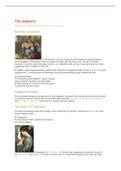Summary
CIE (A Level English Lit.) Summary: The Winter's Tale by W. Shakespeare: The Seasons
- Course
- Institution
- Book
*Detailed information provided further in the description *If you encounter any problems or questions please feel free to contact me! :) In-depth Summary & Essay Preparation: Shakespeare's presentation of the seasons in 'The Winter's Tale' + Quotes. Includes: Summer and winter; Seasonal renewa...
[Show more]




